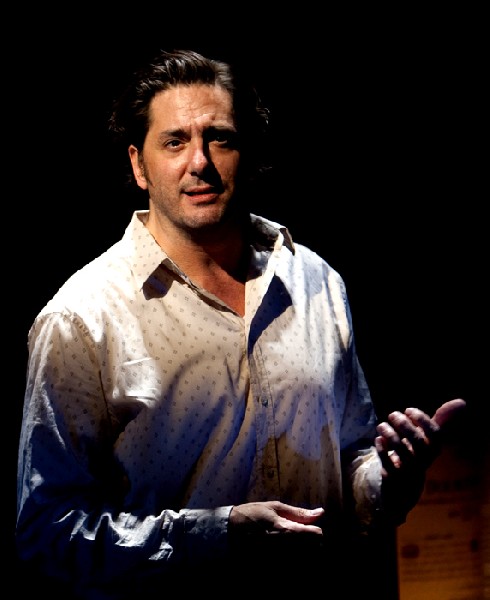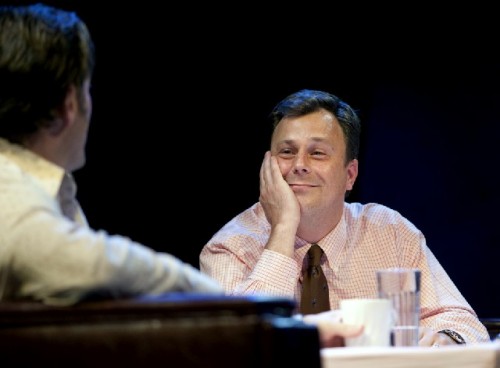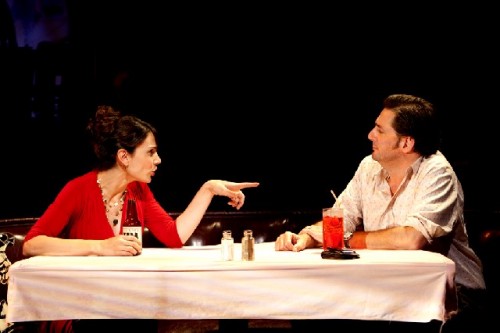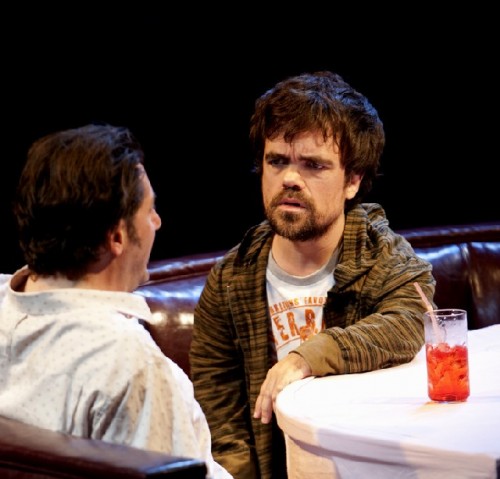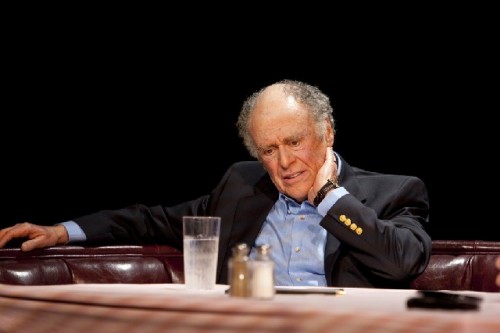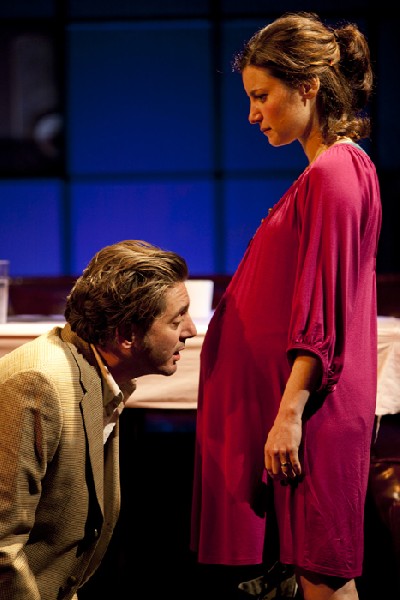Knickerbocker by Jonathan Marc Sherman
Williamstown Theatre Festival Premiere Struck by Lightning
By: Charles Giuliano - Jul 10, 2009
Knickerbocker
By Jonathan Marc Sherman
Directed by Nicholas Martin
Scenic Design, Alexander Dodge; Costume Design, Gabriel Berry; Lighting Design, Philip Rosenberg; Sound Design, Alex Neumann; Original Music, Michael Friedman,; Production Stage Manager, Jillian M. Oliver; Production Manager; Joel M. Krause; Casting, Melcap Casting.
Cast: Reg Rogers (Jerry), Susan Pourfar (Pauline), Brooks Ashmanskas (Melvin), Annie Parisse (Tara), Peter Dinklage (Chester), Bob Dishy (Raymond), Rightor Doyle (Steve),
Knickerbocker Waitstaff: Ben Bandel, James Morosini, Ashley Sumner, Alison Yates.
Williamstown Theatre Festival
Nikos Stage
July 8-19, 2009
Knickerbocker
Etymology: Diedrich Knickerbocker, fictitious author of "History of New York" (1809) by Washington Irving.
Capitalized: A descendant of the early Dutch settlers of New York.
Broadly: A native or resident of the city or state of New York- used as a nickname
In this context "Knickerbocker" is a restaurant in Manhattan frequented by Jerry (Reg Rogers) between April and October of 2008. It is the title of a one act play, running time 90 minutes, by Jonathan Marc Sherman, which is having its world premiere, directed by Nicholas Martin, on the Nikos Stage of the Williamstown Theatre Festival. It is the first of three new plays scheduled for the Nikos this season.
At the age of forty, seemingly after four decades as a man/ child, adolescent Jerry is on the cusp of becoming a father. This is about to force him into a new phase of life with responsibilities and commitments about which he is entirely uncertain. The notion of the play is to allow us to witness how he sorts out this transition through a series of one on one dialogues with his wife Pauline (Susan Pourfar), former girlfriend Tara (Annie Parisse) friends Melvin (Brooks Ashmanskas), Chester (Peter Dinklage) and father Raymond (Bob Dishy). There is also a brief interaction with one of the waiters Steve (Rightor Doyle) of the several who amble about.
The trope of this drama is that all of the action, such as it is, occurs in a large booth set up center stage in an attractive and flashy set of sliding panels with a grid of translucent graphic squares by Scenic Designer Alexander Dodge. It is intended to convey some of the décor of a midscale Manhattan restaurant and local bistro/ hangout for Yuppies like Jerry and his friends. The panels slide back and forth allowing for the mechanics of scene changes and transitions of different pairings in the booth.
We are intended to understand and care about Jerry and his impending crisis. That word, impending, is actually introduced into the dialogue by Chester, with one of the best laughs of the night, as "impending doom." The delivery of a son will, as Chester warns, turn out to be a catastrophe. Through the several dialogues the one constant is Jerry who remains on stage throughout. So the pace and intensity of the play, as it unfolds, is the dynamic inspired by his exchanges. They are intended to convey different aspects of his persona. Ultimately we are asked to care about this man and feel for his dilemma. Well, kindah.
Ultimately, there are too many obstacles in this play and its production that impede that process. While having Jerry stuck in the booth for the entire evening is intended as a metaphor for the hang-ups in his life, it proves to be static and deadening. It freezes the actors who we relate to from the waist up. So it is all dialogue and upper body movement. It becomes acting as a Punch and Judy show. This overly focuses on the text of the script with little or no visual relief. As a colleague commented it was a play that one might have stayed at home and read. What is the compelling reason to see it on stage?
The device of friends meeting and conversing in a booth is not unique. Consider "My Dinner with Andre" or those intervals in "Seinfeld." So it is not that the concept itself is unworkable it is more a matter of how best to exploit the device for dramatic impact. Just what are the advantages and disadvantages of this limitation?
In this context the dialogue must be absolutely brilliant and absorbing. There were moments and insights but I found myself apathetic about Jerry and his dilemma. Not being a parent Astrid commented that she probably identified with the play more than I did. Both as a mother and as a woman. Dolt that I am.
But there was also a disconnect with just who and what Jerry is. There is not much about his life, crisis, or character that really connected with me. Ok, my bad. Arguably others will relate to the play differently.
There was also the matter of pace, direction, and connectivity. Because it is set up as a series of interactions, dialogues, and interludes, it became episodic. Some scenes went better than others largely through the synergy of the two characters on stage at the moment.
The first sequence with Pauline evolved slowly. The couple appears to be getting used to the idea of parenting. Clearly, the entire point of the play is that she is more mature and ready for this than he is. Since his age is set at 40 we assume that she is younger as her clock is still ticking. There is a discussion of the gender of the baby which is growing from the size of a peach; there are peach jokes, to well, a watermelon. There is musing about using fruit as an analogy for babies.
Oddly, because he is not a religious Jew, Jerry insists that the baby will be brised. There is discussion about whether this will be performed in the traditional manner by a Mohel or in a hospital. She raises the issue of resultant lack of sensitivity and is this what they want for their son? His remarks, focused on his sexual prowess, are actually insensitive. As are crude remarks to the ex girlfriend Tara. Something about the taste of his sperm. Jerry emerges as somewhat sexist and oafish. Well, I guess, all guys are, it is just that some of us are better at disguising our primal nature. For women, literally, it's all inside.
This gender difference is expressed by Jerry in broad humor as the male fixation on getting the baby out of the body. He muses that if men had babies they would design zippers and in the instance of multiple births, Velcro. Birth is up there with the Vagina Dentata as one of the top ranked male nightmares. The horror. Like the time when I was a teenager and late at night Dad asked me to drive him to the hospital. I wanted to wait in the car but he insisted that I come along. First he goaded me into observing a natural delivery. That made me woozy. Then watch as Dad performed a C Section. The baby popped up and I went down. Passed out cold.
Perhaps Jerry is going through something like that. The scene with his first of two friends, Melvin, was a blur. The pace and synergy never meshed. They seemed to be delivering rather than feeling their lines and it was never convincing as an actual conversation. There was nothing plausible. Although Ashmanskas brought many gestures and nuances to the performance while Rogers mostly projected his voice. Rogers has an understated, deadpan style of delivery. It's most engaging aspect is ersatz naturalism. Non acting as acting.
The scene with Jerry's stoner friend Chester finally got the play on track. Dinklage was just hilarious as Jerry's "best friend" who wants to warn him, before it's too late, of his many misgivings about Pauline and why he must abandon her and the coming baby. In order to face up to this encounter, which may scuttle their friendship, Chester has had more than a few hits on the bong. This results in over the top acting which seemed to break up the emotional log jam of a drama that was just bogged down. Rogers was also sharper and livelier in this scene as the actors worked well together.
While Jerry is largely apathetic and disconnected from his feelings the contrast with Chester is stark. With enormous exaggeration and great comic impact Chester is profiled as very needy. He overstated that he is Jerry's "best friend" but is left dangling for a similar not forthcoming reassurance. Chester is also sexually insecure as he overstates that he just got the best blowjob of his life the night before. This revelation is projected loudly beyond Jerry toward a couple of waitresses. One of them reacts with interest getting a laugh from the audience. Mostly Chester is played as the wild card in the deck and it is indeed a fascinating and remarkable performance.
This was also true in the scene with Dishy as Raymond, his father. For the only time in the evening there was a real poignancy. They discussed the missing/ deceased, wife/mother. As well as Jerry's apathy about his step mother. Again Sherman milked the raunchy side of Raymond for laughs. The son does not want to hear about the sexuality of the father. Do any of us really want to imagine our parents actually doing it? Gross. As an Italian, of course, I was immaculately conceived even though my mother was Irish.
During one non sequitur interlude, Jerry stepped out of the booth. The panels closed behind him and he delivered the true story of Roy Sullivan who was struck by lightning seven times and lived. It seems that Jerry works for the publishing house of the Guinness Book of Records. It is analogous that his life is trivial and full of tidbits of information. The kicker is that Sullivan survived all those lightning strikes, Jerry runs the numbers on that probability. Then, get this, at the age of 70 Sullivan took his life because of unrequited love.
What are the odds of that happening? Well a long shot. Which is largely how I felt about this play. Too often the drama seemed stuck in a booth giving us, literally, half of the actors to relate to. This was shockingly evident when the cast assembled for bows. While Pourfar was, by then, full term fake pregnant, Parisse was actually carrying. Who knew? It was a surprising signifier of how little we actually came to know these actors and their characters.

